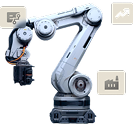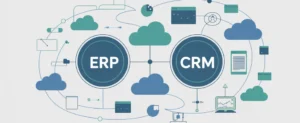
Artificial Intelligence (AI) adoption is accelerating across industries, helping enterprises enhance decision-making, automate workflows, and improve customer experiences. However, AI is only as powerful as the data it processes. Inconsistent, fragmented, or outdated data can lead to inaccurate AI predictions, inefficiencies, and even security vulnerabilities.
For an AI program to deliver real business value, enterprises must ensure seamless system integration, enabling real-time data synchronization across various applications like ERP, CRM, supply chain management, and customer service platforms. Intelligent integration solutions play a crucial role—connecting disparate applications, automating workflows, and preparing enterprises for AI-driven transformation.
A study by McKinsey found that companies with strong integration strategies experience a 40% higher AI-driven efficiency gain than those with fragmented systems. This highlights the critical role integration plays in ensuring AI initiatives reach their full potential.
Why AI Needs Seamless System Integration?
AI thrives on large volumes of structured and unstructured data, which is often scattered across multiple enterprise applications, legacy systems, and cloud platforms. Without seamless integration, businesses encounter several challenges:
- Incomplete or Outdated Data: AI models require real-time, high-quality data to generate accurate insights. Without proper integration, AI models may operate on stale or inconsistent data, leading to suboptimal decisions.
- Automation Inefficiencies: AI-powered automation relies on a steady stream of interconnected data. Without real-time connectivity, process automation suffers from delays and errors.
- Security Vulnerabilities: Poorly integrated systems expose enterprises to security risks as sensitive data flows between disparate platforms without proper monitoring and governance.
A unified integration strategy bridges these gaps, enabling real-time data exchange and ensuring AI models can make informed, data-driven decisions.
Key Areas Where Integration Fuels AI Initiatives
- Predictive Analytics & Decision Intelligence
AI-driven predictive analytics relies on vast amounts of historical and real-time data. Integration plays a crucial role in aggregating and harmonizing this data across multiple enterprise systems:
- Integrated ERP and CRM platforms improve forecasting accuracy by combining financial, customer, and operational data.
- Supply chain integration enhances demand forecasting, helping enterprises optimize inventory and logistics.
- AI-powered risk assessment in banking and insurance is only possible when data from multiple sources—transaction histories, customer profiles, and external market trends—is seamlessly integrated.
- Automation & Workflow Optimization
AI-powered automation enhances business processes, but its effectiveness is contingent on real-time data access and seamless system communication:
- Automated approvals and intelligent routing require integration between AI models, business process management tools, and enterprise applications.
- Task prioritization and predictive maintenance depend on connected IoT sensors, ERP systems, and AI algorithms that analyze operational data in real time.
- HR automation is driven by AI analyzing workforce data across HRMS, payroll, and productivity tools, ensuring optimized workforce planning.
- Customer Experience & Personalization
AI-driven personalization is transforming customer engagement, but it requires integrated customer data from various touchpoints:
- Unified marketing, sales, and customer service systems ensure AI-driven recommendations and support bots offer relevant, real-time assistance.
- Behavioral data integration from web analytics, CRM, and eCommerce platforms helps AI models personalize customer interactions.
- AI-driven chatbots rely on seamless access to historical conversations, transaction data, and service history to provide intelligent, context-aware responses.
- Operational Efficiency & AI-Driven Optimization
AI can optimize supply chain operations, logistics, and vendor management—only if the underlying systems are well-integrated:
- Real-time logistics tracking requires integration between GPS data, warehouse management systems, and ERP software.
- Demand forecasting and inventory optimization depend on AI analyzing sales trends, supplier data, and seasonal fluctuations across various platforms.
- Manufacturing process optimization through AI-enabled predictive maintenance requires IoT sensors feeding real-time machine data into AI models.
The Role of iPaaS in AI Integration
Integration Platform as a Service (iPaaS) solutions simplify AI-driven integration by offering:
- Pre-built connectors for major enterprise applications (ERP, CRM, HRMS, etc.), reducing integration complexity.
- Real-time data synchronization to ensure AI models work with up-to-date information.
- Low-code/no-code automation to streamline data flow management and accelerate AI adoption.
- API management and governance to enhance security and ensure compliance with data regulations.
With a well-defined iPaaS strategy, enterprises can accelerate their AI program while maintaining robust integration, security, and scalability.
Conclusion
AI's potential to revolutionize business operations depends on its ability to process high-quality, real-time data from multiple enterprise systems. Without seamless integration, AI struggles with fragmented data, security vulnerabilities, and inefficiencies.
By adopting a robust integration strategy, enterprises can:
- Enhance AI-driven predictive analytics and automation.
- Deliver hyper-personalized customer experiences.
- Optimize supply chain and operational efficiencies.
- Overcome challenges related to data silos, security, and scalability.
Tellestia, as a digital integration expert, offers tailored solutions to ensure enterprises can harness the full potential of AI. With our expertise in iPaaS, API integration, and workflow automation, we help organizations build a connected IT ecosystem that empowers AI-driven transformation.
Are you ready to integrate your enterprise for AI success? Talk to us today to explore how we can accelerate your AI initiatives through seamless system integration.
Naveen
Director - Client Engagement & Partnership
Naveen is a Director at Tellestia, focused on empowering businesses through innovative tech solutions. He writes about leadership, strategy, and digital transformation.
AI
Automation
Customer Experience
Data Integration
Enterprise Integration
iPaaS
System Integration
trending
Workflow Automation

























